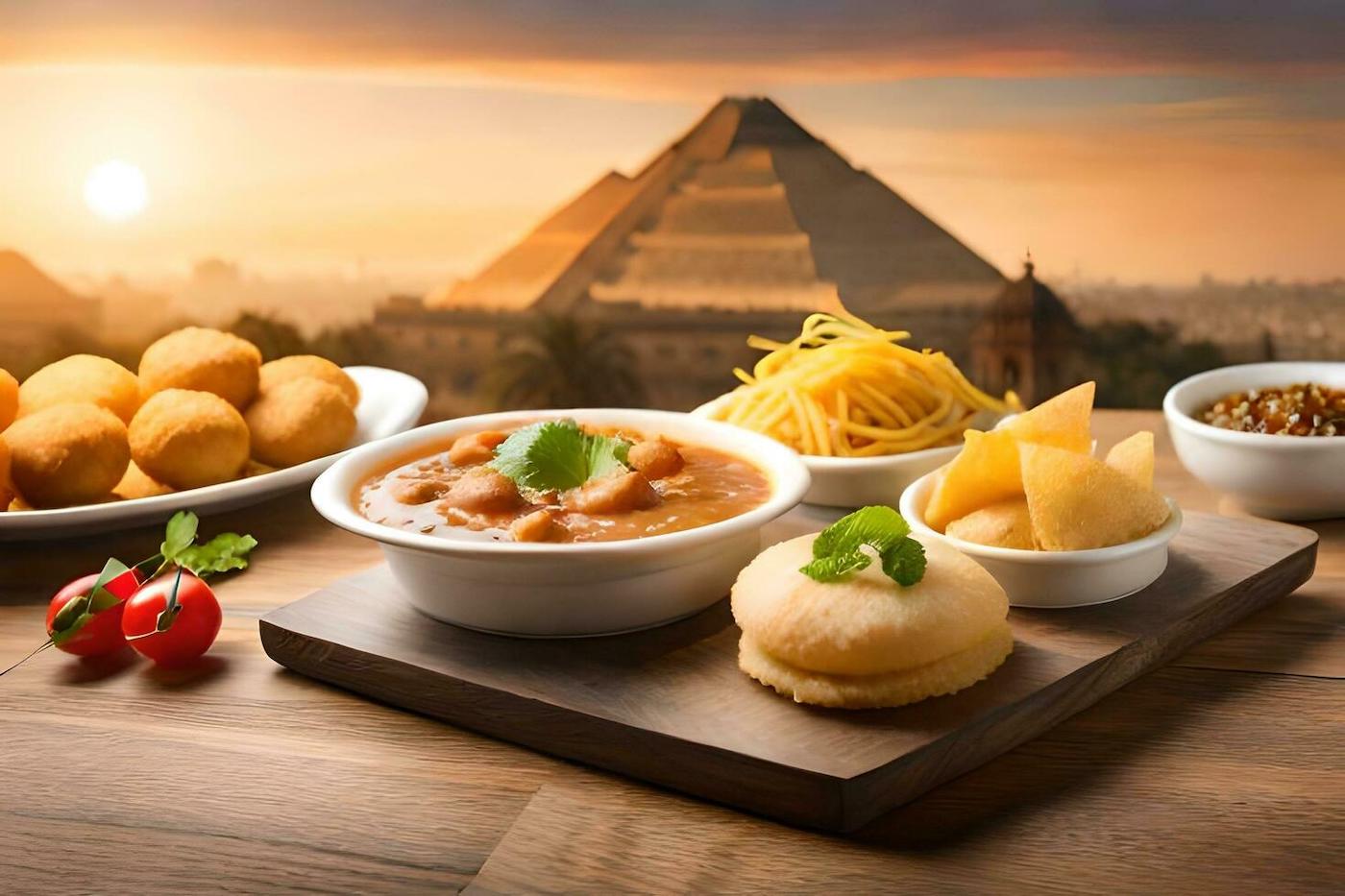Discovering the Flavors of Egypt
Egyptian cuisine is a tantalizing fusion of flavors, aromas, and textures that tell the rich history of this ancient land. From the bustling streets of Cairo to the serene banks of the Nile, food enthusiasts can embark on a culinary journey that promises to delight the senses and provide a deeper understanding of Egypt’s cultural heritage.
When exploring Egyptian cuisine, one must start with the staples that define its essence. Bread, known locally as “aish baladi,” is a cornerstone of Egyptian meals. This round, flatbread, often baked in communal ovens, is more than just a food item; it is a symbol of sustenance and community. Made from whole wheat flour, aish baladi has a distinctive chewy texture and a slightly nutty flavor that pairs perfectly with various dips and stews.
Another fundamental component is ful medames, a dish made from slow-cooked fava beans seasoned with olive oil, garlic, and lemon juice. Traditionally served for breakfast, ful medames is often accompanied by hard-boiled eggs, fresh vegetables, and a drizzle of tahini sauce. Its hearty and nutritious nature makes it a beloved comfort food across Egypt, offering a glimpse into the daily life of Egyptians.
Must-Try Dishes
Egypt’s culinary repertoire is vast, but there are a few must-try dishes that every visitor should experience. Koshari is one such dish that stands out not only for its deliciousness but also for its unique combination of ingredients. A medley of rice, lentils, pasta, and chickpeas topped with a tangy tomato sauce and crispy fried onions, koshari is a true representation of Egypt’s diverse influences. This dish is a favorite among locals and can be found in street vendors and restaurants alike.
Another dish that captures the essence of Egyptian cuisine is molokhia, a green leafy vegetable stew that has been enjoyed since ancient times. The leaves of the molokhia plant are finely chopped and cooked with garlic, coriander, and broth, resulting in a thick, flavorful soup often served with rice or bread. Its slightly slimy texture might be unfamiliar to some, but its rich, earthy flavor makes it a culinary gem worth trying.
For those with a sweet tooth, Egyptian desserts are a revelation. Basbousa, a semolina cake soaked in sweet syrup, is a popular choice. Often garnished with almonds or coconut, this moist and fragrant cake is a perfect end to any meal. Another delightful treat is konafa, a pastry made from thin strands of dough soaked in syrup and typically filled with nuts, cheese, or cream. The combination of crunchy and sweet elements makes konafa an irresistible indulgence.
Street Food Adventures
No culinary adventure in Egypt is complete without exploring its vibrant street food scene. Street vendors offer a variety of mouth-watering snacks that are both affordable and delicious. Taameya, the Egyptian version of falafel, is made from fava beans instead of chickpeas, giving it a distinct flavor and texture. Crispy on the outside and tender on the inside, taameya is usually served in pita bread with fresh vegetables and tahini sauce.
Shawarma, another street food staple, consists of thinly sliced marinated meat, typically lamb or chicken, roasted on a vertical spit and served in a sandwich with vegetables and sauce. The smoky, savory flavors of shawarma make it a popular choice for a quick and satisfying meal.
For a refreshing treat, sugarcane juice or “asab” is a must-try. Extracted from fresh sugarcane stalks, this sweet and cooling beverage is perfect for beating the Egyptian heat. Street vendors prepare it on the spot, ensuring that you get the freshest taste possible.
Traditional Restaurants to Visit
While street food offers a taste of everyday life in Egypt, traditional restaurants provide a more immersive dining experience. Cairo, in particular, is home to several renowned eateries that serve authentic Egyptian cuisine in a setting that reflects the country’s rich heritage.
Abou El Sid, located in the heart of Cairo, is a restaurant that transports diners back to the days of old Cairo. With its ornate decor and vintage photographs, Abou El Sid offers a menu filled with classic Egyptian dishes such as stuffed pigeon, lamb shank, and various mezze. The warm and inviting atmosphere makes it a perfect spot for a leisurely meal with friends and family.
Another notable restaurant is Felfela, a historic establishment that has been serving traditional Egyptian food since 1959. Known for its iconic interior filled with artifacts and memorabilia, Felfela offers a wide range of dishes, including grilled meats, seafood, and vegetarian options. The restaurant’s commitment to preserving the flavors of Egypt makes it a favorite among locals and tourists alike.
For a truly unique dining experience, Naguib Mahfouz Cafe in Khan El Khalili bazaar offers a blend of literature and cuisine. Named after the Nobel Prize-winning Egyptian writer, this cafe serves delicious Egyptian fare in an ambiance inspired by Mahfouz’s novels. Visitors can enjoy dishes like moussaka and stuffed vine leaves while soaking in the cultural and historical vibes of the bazaar.
Embarking on a Gastronomic Journey
Embarking on a gastronomic journey in Egypt is not just about tasting the food but also about understanding the cultural and historical context behind each dish. The use of spices, cooking techniques, and ingredients reflects the country’s rich history of trade and interaction with different civilizations.
Spices play a crucial role in Egyptian cuisine, with cumin, coriander, and garlic being some of the most commonly used. These spices not only enhance the flavor of dishes but also have health benefits, which have been recognized since ancient times. The use of herbs such as parsley and dill adds freshness and a burst of flavor, making each dish a harmonious blend of tastes.
The cooking techniques in Egypt are diverse, ranging from slow-cooking methods that bring out deep flavors to quick frying that retains the natural taste of ingredients. Traditional clay ovens, known as “taboons,” are still used in some parts of the country to bake bread and other dishes, providing a unique taste that modern ovens cannot replicate.
Bringing Egyptian Flavors Home
For those who wish to bring a piece of Egypt back home, learning to cook Egyptian dishes is a rewarding experience. Many traditional recipes are simple yet flavorful, making them perfect for home cooks of all levels. Cooking classes are available in many cities, offering hands-on experience in preparing iconic dishes like ful medames, koshari, and baklava.
Additionally, local markets are treasure troves of spices and ingredients that are essential for authentic Egyptian cooking. The vibrant colors and aromatic scents of the markets provide an immersive experience, allowing visitors to choose the freshest and highest quality products.
Online resources and cookbooks also offer valuable insights into Egyptian culinary traditions. By experimenting with different recipes and techniques, food enthusiasts can recreate the flavors of Egypt in their own kitchens, keeping the culinary adventure alive long after their visit.
The Cultural Significance of Egyptian Cuisine
Egyptian cuisine is not just about food; it is about community and tradition. Meals are often shared with family and friends, with dishes placed in the center of the table for everyone to enjoy. This communal way of eating fosters a sense of togetherness and celebration, reflecting the importance of food in Egyptian social life.
Festivals and religious holidays are also marked by special dishes and culinary traditions. During Ramadan, for example, the fast is broken each evening with a meal called iftar, which includes a variety of dishes such as dates, lentil soup, and konafa. These meals are often shared with extended family and neighbors, highlighting the communal spirit of the occasion.
Similarly, weddings and celebrations feature elaborate feasts with multiple courses, showcasing the best of Egyptian hospitality. These events provide an opportunity for guests to experience the full spectrum of Egyptian cuisine, from savory appetizers to decadent desserts.
A culinary adventure in Egypt offers more than just delicious food; it provides a deep connection to the country’s culture and history. By exploring the diverse flavors and traditions of Egyptian cuisine, tourists from the USA and England can embark on a gastronomic journey that enriches their travel experience. Whether savoring street food in Cairo or dining in traditional restaurants, the tastes of Egypt promise to leave a lasting impression.







